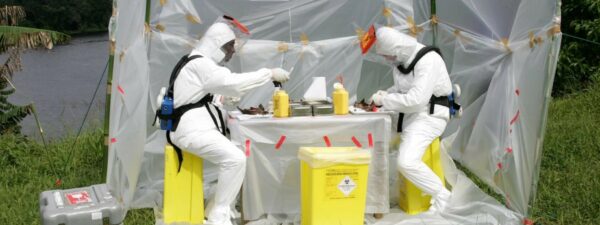Research-intervention to understand the Marburg Virus in Equatorial Guinea
Research-intervention to understand the Marburg Virus in Equatorial Guinea

© IRD – Jean-Jacques Lemasson
Staff from CREMER (Cameroon) took part in training in “One Health” investigations and coordinated a Marburg investigation mission with a One Health approach in the border areas with Equatorial Guinea.
Following the outbreak of Marburg virus disease in Equatorial Guinea in February 2023, the risk of Marburg virus circulation in the Cameroonian region at the border between the two countries was considered serious. As a result, multi-partner, multi-disciplinary investigations were carried out, involving researchers in the social sciences, ecology, veterinary sciences, virology and clinical medicine in a One Health approach – a real scientific and logistical challenge.
“We had to search for suspected cases and follow up contact cases, capture bats considered to be reservoirs in order to establish their distribution in the region, identify the virus in these animals, document risk behaviors (handling, marketing and consumption of bat meat) and raise awareness of the zoonotic nature of Marburg disease among populations in at-risk areas“, explains Charles Kouanfack, technical and scientific coordinator of CREMER, in IRD le Mag’
Thanks to the support provided by the AFROSCREEN project for the operation of the CREMER laboratory’s sequencing platform, the samples collected during the investigation missions will be sequenced and the viruses identified and characterized.
To read the full article: https://lemag.ird.fr/fr/epidemie-de-marburg-la-recherche-intervention-en-premiere-ligne

© IRD – Jean-Jacques Lemasson
Staff from CREMER (Cameroon) took part in training in “One Health” investigations and coordinated a Marburg investigation mission with a One Health approach in the border areas with Equatorial Guinea.
Following the outbreak of Marburg virus disease in Equatorial Guinea in February 2023, the risk of Marburg virus circulation in the Cameroonian region at the border between the two countries was considered serious. As a result, multi-partner, multi-disciplinary investigations were carried out, involving researchers in the social sciences, ecology, veterinary sciences, virology and clinical medicine in a One Health approach – a real scientific and logistical challenge.
“We had to search for suspected cases and follow up contact cases, capture bats considered to be reservoirs in order to establish their distribution in the region, identify the virus in these animals, document risk behaviors (handling, marketing and consumption of bat meat) and raise awareness of the zoonotic nature of Marburg disease among populations in at-risk areas“, explains Charles Kouanfack, technical and scientific coordinator of CREMER, in IRD le Mag’
Thanks to the support provided by the AFROSCREEN project for the operation of the CREMER laboratory’s sequencing platform, the samples collected during the investigation missions will be sequenced and the viruses identified and characterized.
To read the full article: https://lemag.ird.fr/fr/epidemie-de-marburg-la-recherche-intervention-en-premiere-ligne
